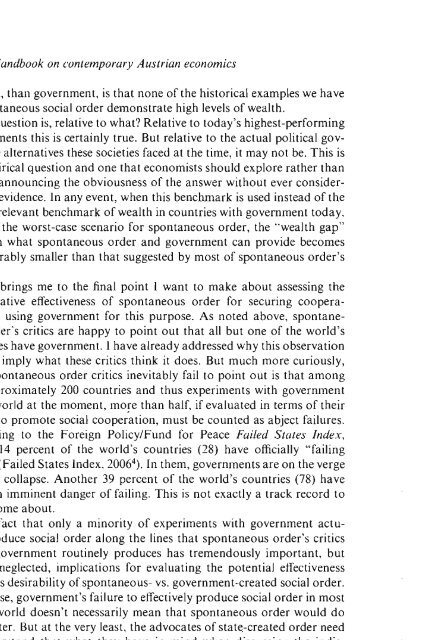Handbook on Contemporary Austrian Economics
Handbook on Contemporary Austrian Economics
Handbook on Contemporary Austrian Economics
Create successful ePaper yourself
Turn your PDF publications into a flip-book with our unique Google optimized e-Paper software.
148 <str<strong>on</strong>g>Handbook</str<strong>on</strong>g> <strong>on</strong> c<strong>on</strong>temporary <strong>Austrian</strong> ec<strong>on</strong>omics<br />
efficient, than government, is that n<strong>on</strong>e of the historical examples we have<br />
of sp<strong>on</strong>taneous social order dem<strong>on</strong>strate high levels of wealth.<br />
My questi<strong>on</strong> is, relative to what Relative to today's highest-performing<br />
governments this is certainly true. But relative to the actual political governance<br />
alternatives these societies faced at the time, it may not be. This is<br />
an empirical questi<strong>on</strong> and <strong>on</strong>e that ec<strong>on</strong>omists should explore rather than<br />
simply announcing the obviousness of the answer without ever c<strong>on</strong>sidering<br />
the evidence. In any event, when this benchmark is used instead of the<br />
quite irrelevant benchmark of wealth in countries with government today,<br />
even in the worst-case scenario for sp<strong>on</strong>taneous order, the "wealth gap"<br />
between what sp<strong>on</strong>taneous order and government can provide becomes<br />
c<strong>on</strong>siderably smaller than that suggested by most of sp<strong>on</strong>taneous order's<br />
critics.<br />
This brings me to the final point I want to make about assessing the<br />
comparative effectiveness of sp<strong>on</strong>taneous order for securing cooperati<strong>on</strong><br />
vs. using government for this purpose. As noted above, sp<strong>on</strong>taneous<br />
order's critics are happy to point out that all but <strong>on</strong>e of the world's<br />
countries have government. I have already addressed why this observati<strong>on</strong><br />
doesn't imply what these critics think it does. But much more curiously,<br />
what sp<strong>on</strong>taneous order critics inevitably fail to point out is that am<strong>on</strong>g<br />
the approximately 200 countries and thus experiments with government<br />
in the world at the moment, more than half, if evaluated in terms of their<br />
ability to promote social cooperati<strong>on</strong>, must be counted as abject failures.<br />
According to the Foreign Policy/Fund for Peace Failed States Index ,<br />
nearly 14 percent of the world's countries (28) have officially "failing<br />
states" (Failed States Index, 2006 4 ). In them, governments are <strong>on</strong> the verge<br />
of total collapse. Another 39 percent of the world's countries (78) have<br />
states in imminent danger of failing. This is not exactly a track record to<br />
write home about.<br />
The fact that <strong>on</strong>ly a minority of experiments with government actually<br />
produce social order al<strong>on</strong>g the lines that sp<strong>on</strong>taneous order's critics<br />
imply government routinely produces has tremendously important, but<br />
totally neglected, implicati<strong>on</strong>s for evaluating the potential effectiveness<br />
and thus desirability of sp<strong>on</strong>taneous- vs. government-created social order.<br />
Of course, government's failure to effectively produce social order in most<br />
of the world doesn't necessarily mean that sp<strong>on</strong>taneous order would do<br />
any better. But at the very least, the advocates of stat~-created order need<br />
to understand that what they have in mind when discussing the indispensability<br />
of government for wealth and prosperity is in fact a minority<br />
of remarkably successful governments - namely those located in North<br />
America and Western Europe. What they have in mind is the excepti<strong>on</strong>,<br />
not the rule.

















